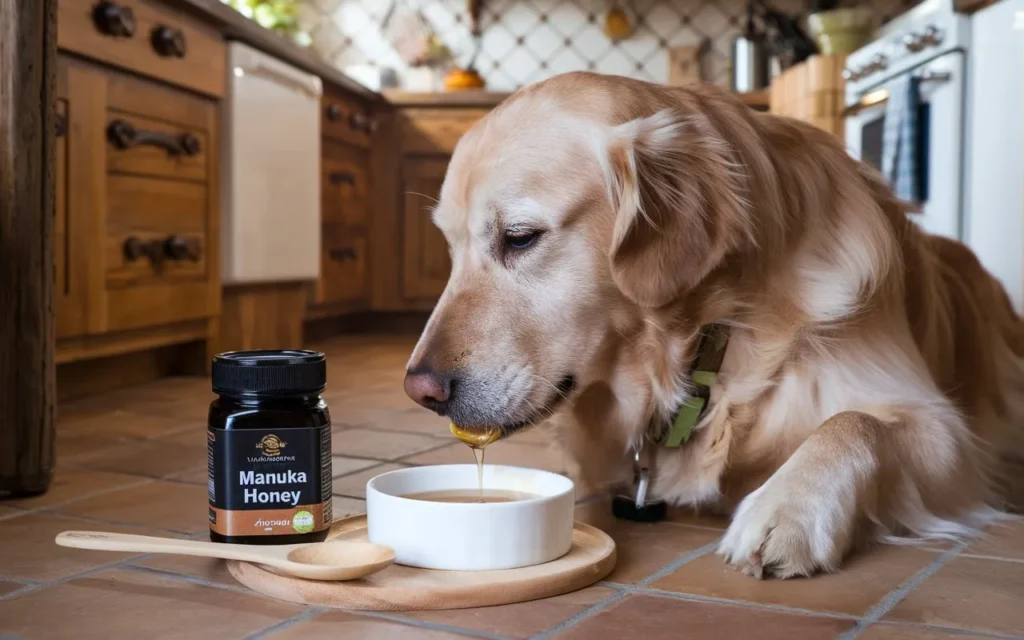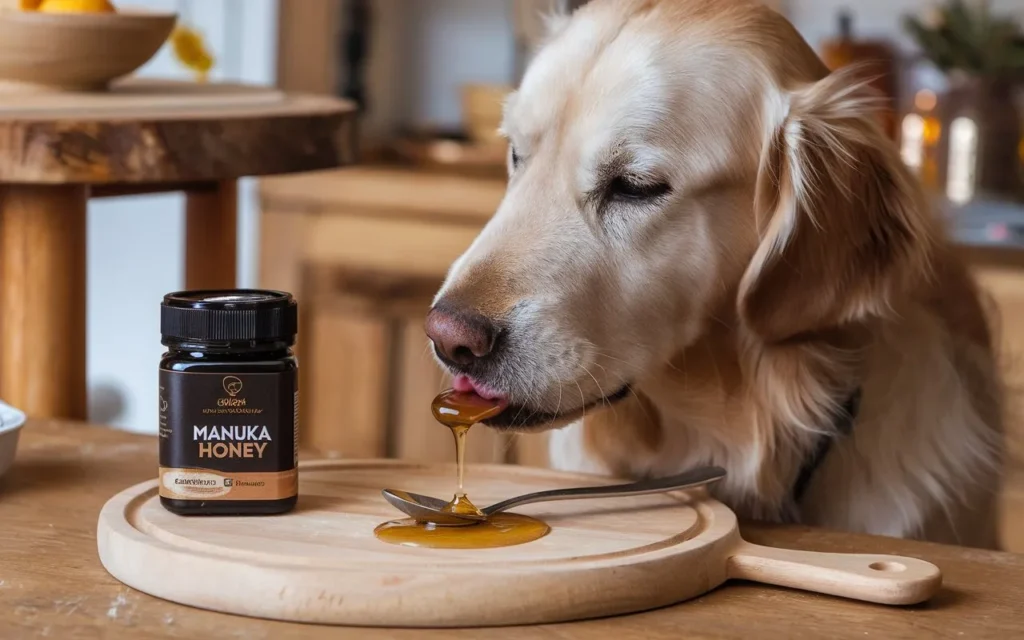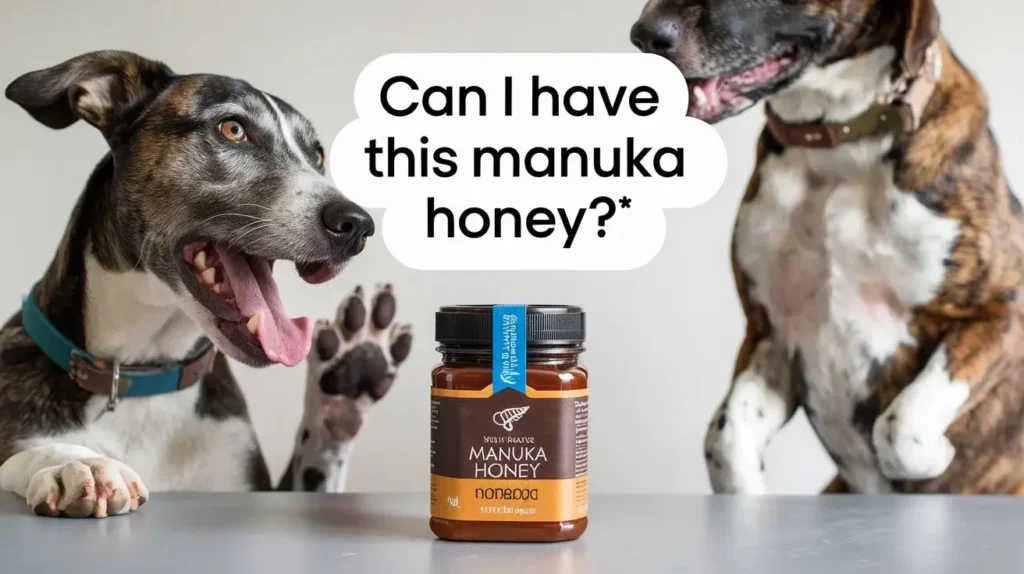As a devoted dog owner, you’re undoubtedly always on the lookout for ways to enhance your furry friend’s health and well-being. In recent years, one natural remedy that has gained significant popularity is Manuka honey. However, you might be wondering, “Can dogs have Manuka honey safely?” To address this question, let’s explore the benefits, risks, and proper usage of Manuka honey for dogs, including its potential effectiveness for treating kennel cough.
What is Manuka Honey?
Before we delve into whether dogs can have Manuka honey, it is first crucial to understand what makes this honey so special. This honey is made by bees who pollinate the Manuka bush-native to New Zealand. It is also renowned for its antibacterial properties and has been applied in folk medicine over many years.
Can Dogs Have Manuka Honey?
To answer the burning question, yes, dogs can indeed have Manuka honey in moderation. Moreover, this natural sweetener offers several potential health benefits for our canine companions. However, it’s crucial to use it correctly and be aware of any possible risks.
Benefits of Manuka Honey for Dogs
1. Antibacterial Properties
First and foremost, Manuka honey contains a compound called methylglyoxal (MGO), which gives it potent antibacterial properties. Consequently, this can help fight off harmful bacteria in your dog’s body.
2. Wound Healing
Furthermore, the antimicrobial nature of Manuka honey makes it useful for treating minor wounds and cuts on your dog’s skin.
3. Digestive Health
Additionally, some pet owners report that Manuka honey helps soothe their dog’s upset stomach and improve overall digestive health.
4. Immune System Support
Moreover, the antioxidants in Manuka honey may help boost your dog’s immune system, potentially leading to better overall health.
5. Allergy Relief
Lastly, some dogs may experience relief from seasonal allergies when given small amounts of local honey, including Manuka honey.

Can Dogs Have Manuka Honey for Kennel Cough?
One common question pet owners often ask is, “Can dogs have Manuka honey for kennel cough?” To address this, let’s first understand that kennel cough is a highly contagious respiratory infection affecting dogs, causing a persistent, harsh cough. While Manuka honey isn’t a cure for kennel cough, it may help alleviate some symptoms due to its antibacterial and soothing properties.
How Manuka Honey May Help with Kennel Cough:
- Soothing the Throat: First and foremost, the smooth texture of honey can help coat and soothe your dog’s irritated throat, potentially reducing coughing.
- Antibacterial Action: Furthermore, Manuka honey’s antibacterial properties may help fight off the bacteria causing the infection.
- Boosting Immunity: Additionally, the antioxidants in Manuka honey could support your dog’s immune system as it fights off the infection.
While some pet owners swear by Manuka honey for kennel cough, it’s essential to consult with your veterinarian before using it as a treatment. After all, kennel cough can be serious, and professional medical advice is crucial.
How to Give Manuka Honey to Your Dog
If you’re wondering, “Can my dog have Manuka honey?” it’s important to know the proper way to administer it. Therefore, here are some guidelines to follow:
1. Start Small
First, begin with a small amount to ensure your dog doesn’t have any adverse reactions.
2. Adjust Based on Size
Next, the amount of honey you give should depend on your dog’s size:
- Small dogs: 1/4 teaspoon
- Medium dogs: 1/2 teaspoon
- Large dogs: 1 teaspoon
3. Frequency
Additionally, give Manuka honey to your dog no more than once or twice a day.
4. Method of Administration
Moreover, you can offer the honey directly from a spoon or mix it into your dog’s food.
5. Quality Matters
Finally, opt for top-grade, unadulterated Manuka honey that contains no additives.
Precautions When Giving Manuka Honey to Dogs
While Manuka honey can be beneficial, there are some precautions to keep in mind:
1. Sugar Content
First of all, Manuka honey is high in sugar. Therefore, if your dog is overweight or diabetic, consult your vet before adding it to their diet.
2. Dental Health
Furthermore, the sugar in honey can contribute to tooth decay. Consequently, always brush your dog’s teeth regularly, especially if you’re giving them honey.
3. Allergic Reactions
Although rare, some dogs may be allergic to honey. Hence, watch for signs of an allergic reaction, such as itching or swelling.
4. Botulism Risk in Puppies
Most importantly, never give honey to puppies under one year old, as their immune systems aren’t developed enough to handle potential botulism spores.
5. Not a Substitute for Medical Treatment
Finally, while Manuka honey can complement your dog’s health regimen, it should never replace proper veterinary care.
Can a Dog Have Manuka Honey Every Day?
While Manuka honey is generally safe for dogs, it’s not recommended to give it to them every day. In fact, moderation is key when it comes to any treat or supplement in your dog’s diet. Therefore, occasional use, or as directed by your veterinarian, is the best approach.
Alternative Uses of Manuka Honey for Dogs
Beyond internal consumption, Manuka honey can be used topically for dogs in several ways:
1. Wound Care
Firstly, apply a thin layer of Manuka honey to minor cuts or scrapes to promote healing and prevent infection.
2. Hot Spots
Additionally, the antibacterial properties of Manuka honey may help soothe and heal hot spots on your dog’s skin.
3. Paw Pad Protection
Moreover, in winter, applying a small amount of Manuka honey to your dog’s paw pads can help protect them from salt and ice.
4. Skin Conditions
Lastly, some pet owners use Manuka honey to help manage skin conditions like eczema or dermatitis in dogs.
When to Avoid Giving Your Dog Manuka Honey
There are certain situations where you should avoid giving your dog Manuka honey:
1. Diabetes
First and foremost, dogs with diabetes should not have Manuka honey due to its high sugar content.
2. Obesity
Furthermore, if your dog is overweight, the extra calories from honey could exacerbate the problem.
3. Allergies
Additionally, if your dog has known allergies to bee products, avoid Manuka honey.
4. Dental Issues
Moreover, dogs with a history of dental problems may be better off avoiding sugary treats like honey.
5. Gastrointestinal Sensitivities
Lastly, some dogs with sensitive stomachs may not tolerate honey well.

Choosing the Right Manuka Honey for Your Dog
When selecting Manuka honey for your dog, consider the following:
1. UMF Rating
First, look for honey with a Unique Manuka Factor (UMF) rating of 10+ or higher for the best antibacterial properties.
2. Purity
Additionally, choose 100% pure Manuka honey without any additives or fillers.
3. Source
Moreover, opt for honey from reputable sources in New Zealand to ensure authenticity.
4. Packaging
Lastly, select honey in dark, opaque containers to protect it from light degradation.
Frequently Asked Questions About Dogs and Manuka Honey
1. Can dogs have Manuka honey for allergies?
While some pet owners report success in using Manuka honey for allergies in dogs, scientific evidence is limited. Therefore, consult your vet before using it for this purpose.
2. How much Manuka honey can I give my dog for kennel cough?
This depends on the size of your dog, but a common amount would be one teaspoonful for large dogs, half a teaspoon for medium, and a quarter for small dogs daily, once or twice a day, in advance of symptoms.
3. Is Manuka honey safe for all breeds of dogs?
While Manuka honey is generally safe for most dog breeds, individual dogs may react differently. Therefore, always introduce new foods slowly and watch for any adverse reactions.
4. Can Manuka honey help with my dog’s bad breath?
Some pet owners claim Manuka honey helps with their dog’s breath, possibly due to its antibacterial properties. Nonetheless, it should not replace regular dental hygiene practices.
5. How long does it take to see benefits from giving my dog Manuka honey?
The timeframe can vary depending on what you’re using it for. For instance, for wound healing, you might see improvements in a few days. On the other hand, for internal benefits, it may take several weeks of consistent use.
6. where to buy manuka honey for dogs
Manuka honey for dogs can be purchased from various reputable sources, including online retailers such as Amazon, Chewy, and Walmart, where a range of brands are available along with customer reviews to help ensure authenticity. When buying, it’s essential to check the UMF or MGO rating on the label. Additionally, health food stores like Whole Foods or local specialty shops may carry high-quality Manuka honey, often from trusted brands. Always ensure you are getting a product that is safe and appropriate for your dog , more infos where to buy manuka honey for dogs .
Conclusion: Manuka Honey as a Beneficial Treat for Dogs
Can dogs have Manuka honey? Yes, Manuka honey, if applied correctly, can be a great addition to the diet of your dog. Because of its antibacterial properties, it even helps in soothing symptoms of kennel cough among many other health-related benefits, and this is absolutely something that could attract your interest as a natural remedy for your dog.
It is, however, important to note that Manuka honey should be given out in moderation and is not for every dog. Thus, it is recommended to consult with your veterinarian before supplementing Manuka honey or any other new supplement into your dog’s diet, especially if you are considering giving your dog such supplements for the treatment of conditions like kennel cough.
By following the guidelines provided in this article and in close collaboration with your veterinarian, you will be able to safely unlock the benefits of Manuka honey for your furry friend. Keep in mind that while natural remedies are occasionally useful, they cannot substitute for proper veterinary care and a well-rounded diet for your beloved canine companion.








